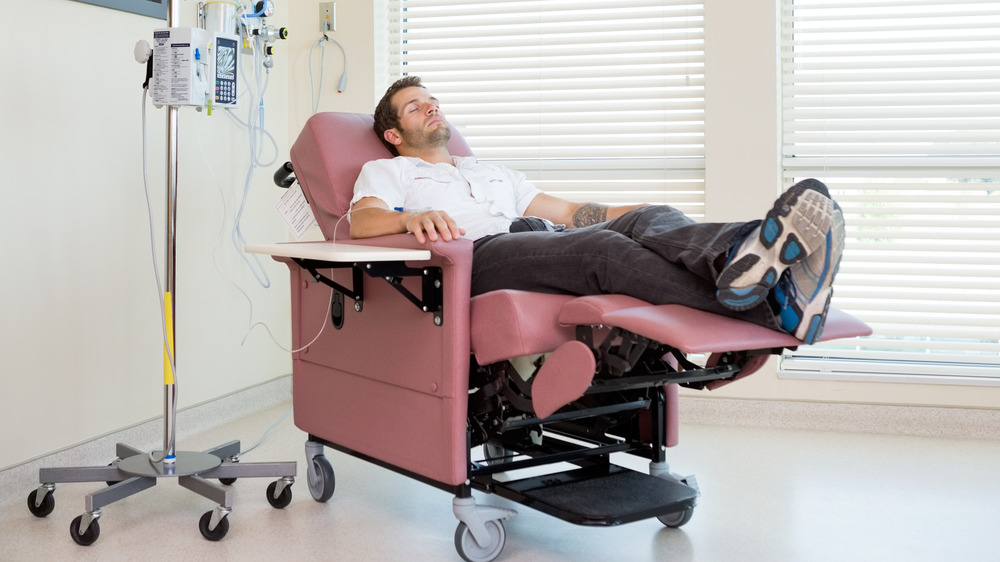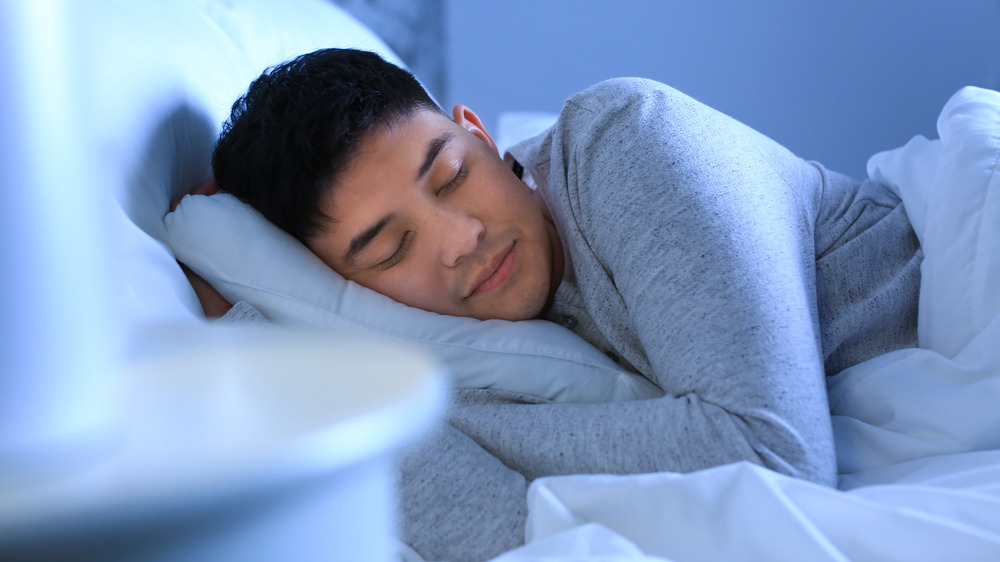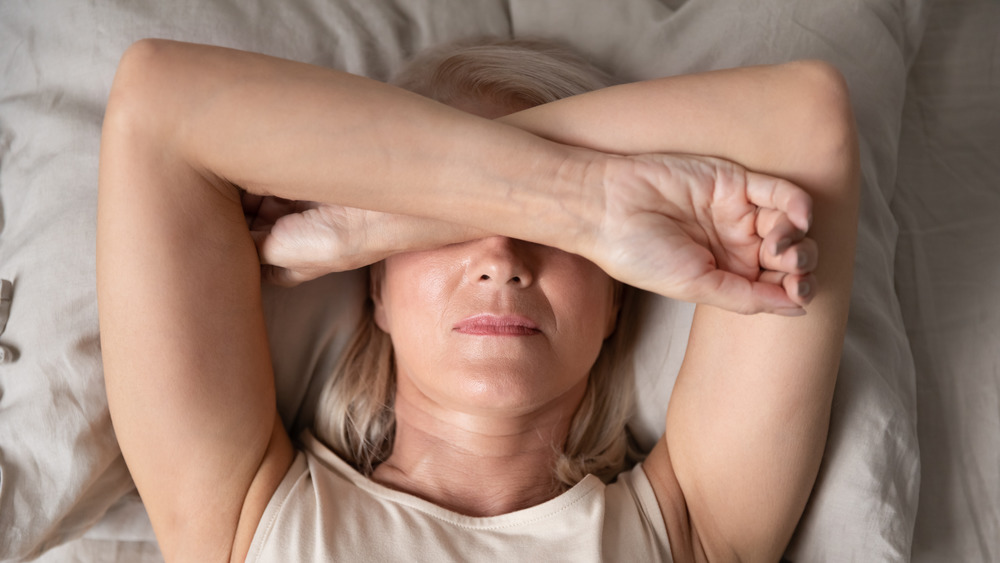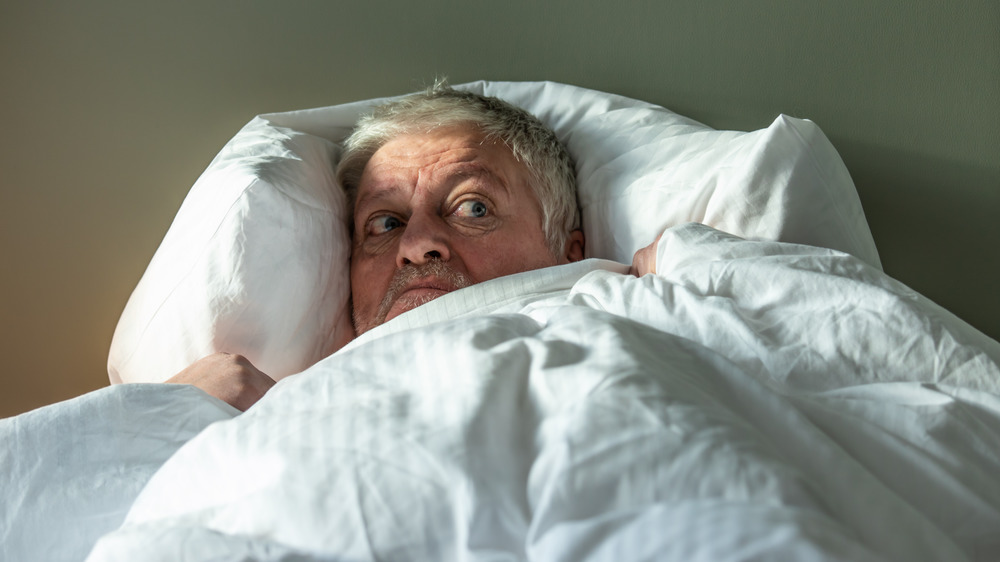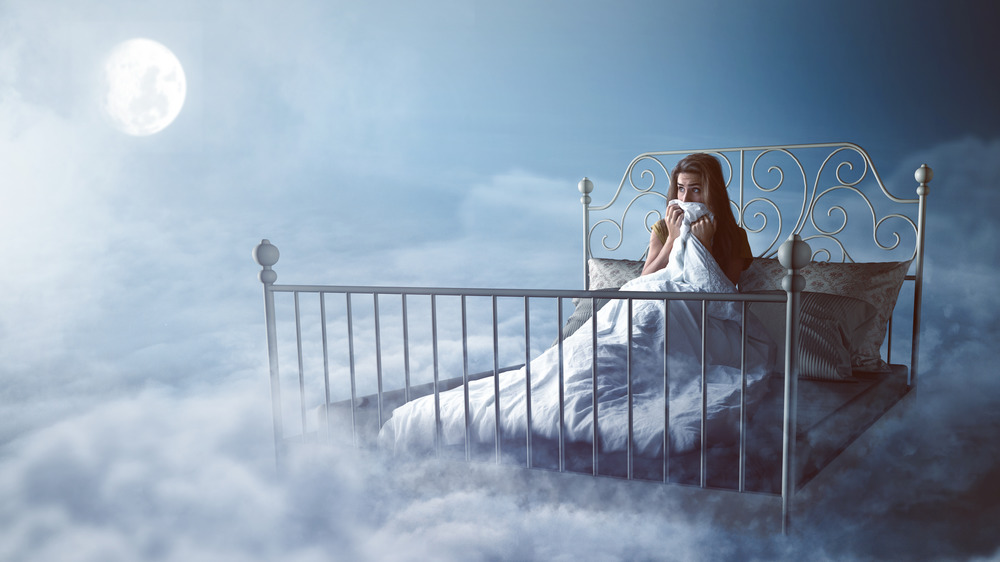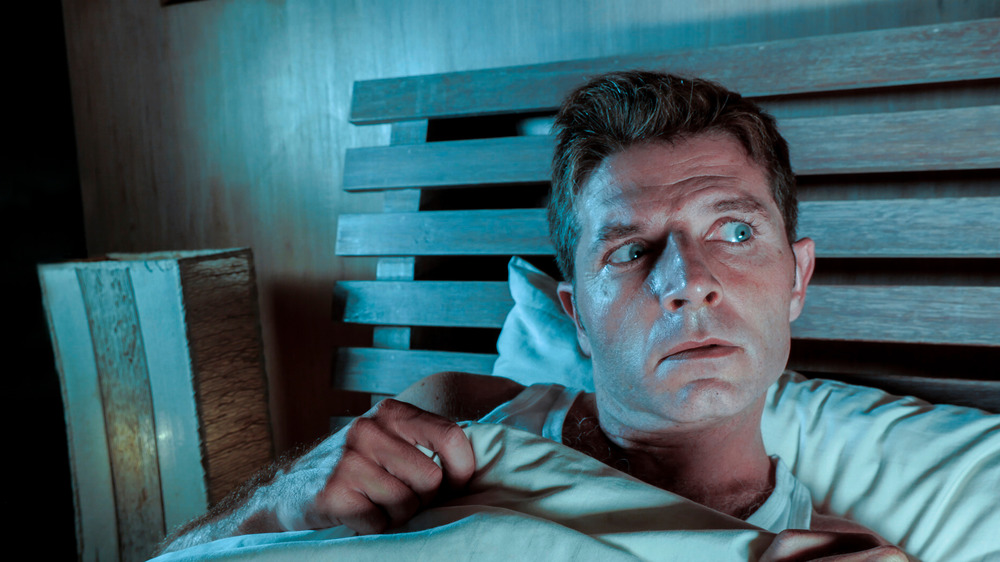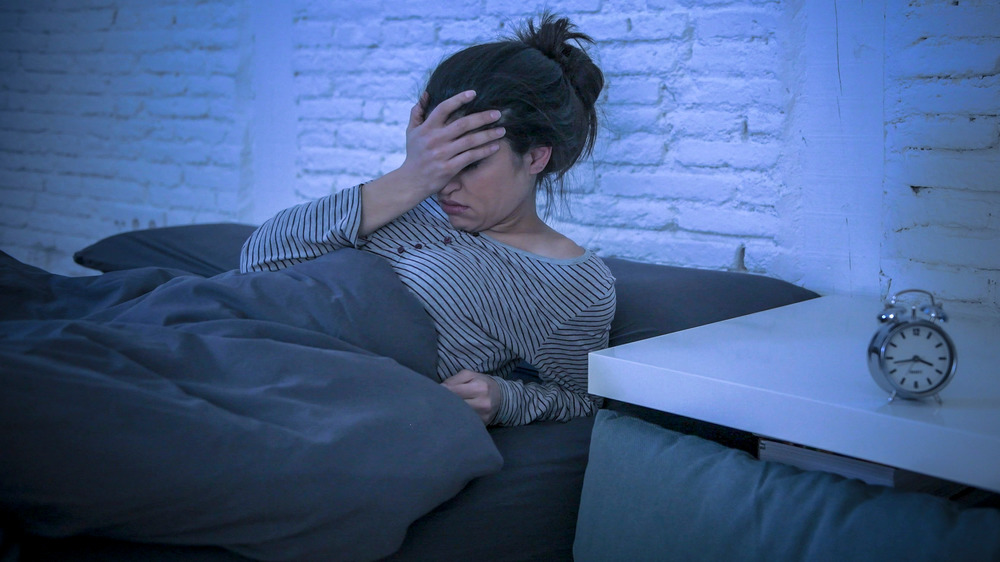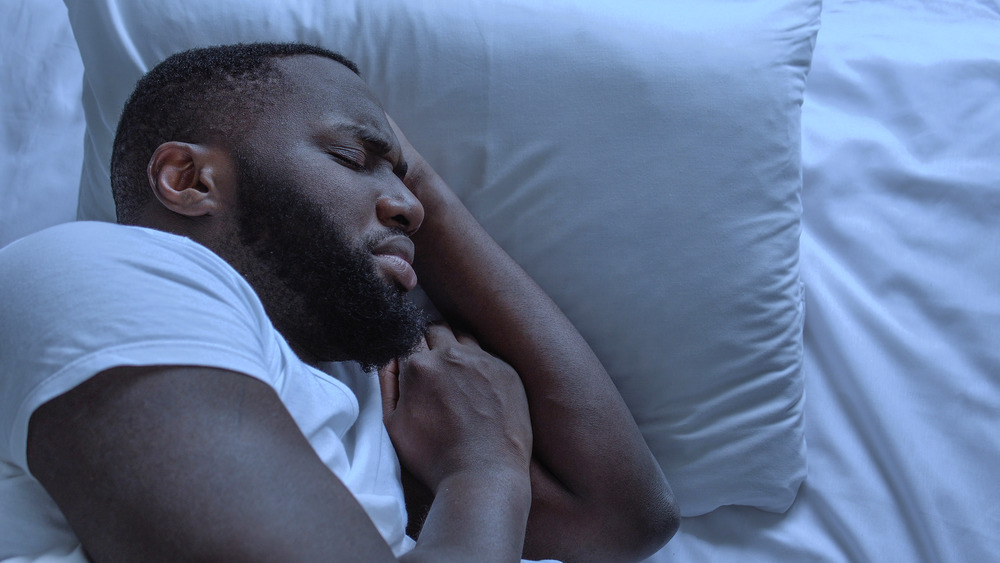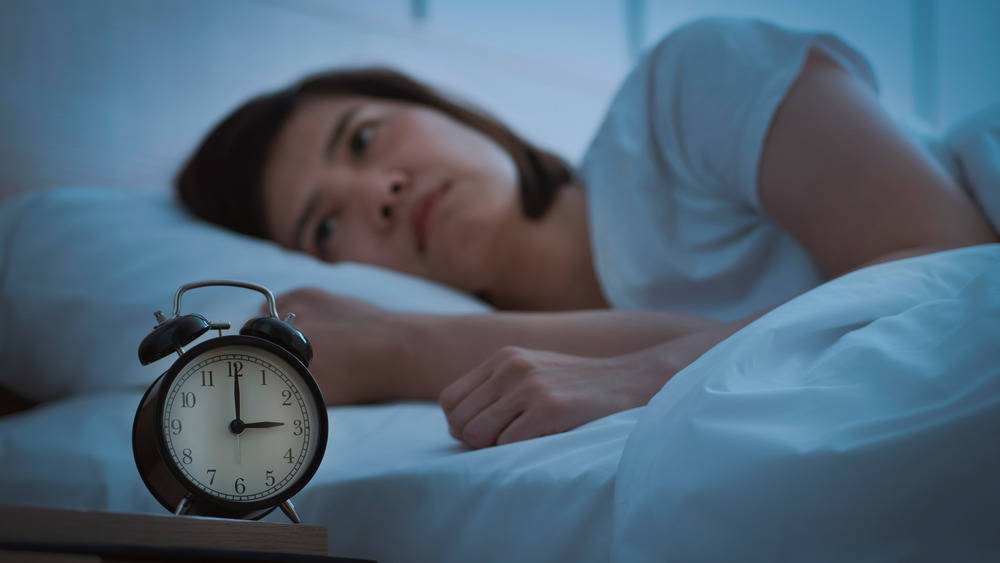Things Your Dreams Can Tell You About Your Health
Dreams have been fascinating humans for as long as humans have been dreaming. Although scientists who study the human mind may disagree about what our dreams signify or whether they signify anything at all, it's generally accepted that our dreams often reflect our everyday lives — such as who we are, whom we know, and where we live, psychologist Kelly Bulkely revealed in an article for Psychology Today. To put it another way, regardless of their "meanings," the contents of our dreams will, at least to some extent, reflect what is in our minds. But can dreams also reflect what is going on in our bodies?
"Detectable changes occur in the body at the onset of disease, prior to the presence of recognizable symptoms," Michelle Carr, a postdoctoral associate who conducts sleep research at the University of Rochester Sleep and Neurophysiology Laboratory, wrote in Psychology Today. "These subtle physiological changes are ... detected by the brain on a subconscious level, and may be translated into 'prodromal' dreams — dreams that reflect the onset of an illness prior to the appearance of symptoms." And psychologists are not the only ones who subscribe to this notion. Read on to learn some of the things your dreams can reveal about your health.
Dreaming you're choking can mean you're coming down with an illness
"Recognizing prodromal dream cues can be particularly useful for establishing early interventions against sickness," sleep researcher Michelle Carr revealed in an article for Psychology Today. "As soon as the immune system recognizes the [cold] virus," explained Carr, "physiological changes begin to take place." Hours or even days before we might recognize that we have come down with a cold, the body is already experiencing these changes, at least on a subtle level, and that can lead to dreams related to those changes.
One change that often happens when we are coming down with a cold is throat inflammation (via Johns Hopkins Medicine). Even if your throat doesn't hurt, the inflammation is there, and you might dream that you are choking. "Such a dream, if heeded, could afford you extra time to take defensive measures to shorten the duration of a cold, perhaps by drinking herbal infusions or following other tips," according to Carr.
Your dreams could tell you that you have a tumor somewhere in your body
The most obvious way that our dreams can reflect what is going on with our health is through imagery of wounds, pain, and other sensations, sleep researcher Michelle Carr revealed in an article for Psychology Today. Carr offered the example of a man who was diagnosed with an ulcer after suffering from recurring, disturbing dreams of a rat gnawing at his belly.
Additionally, physician Christiane Northrup wrote on her website that a colleague "once dreamt that he was bleeding to death from his rectum," and soon after found out that he had early stage colon cancer. "He credits the dream with saving his life," wrote Dr. Northrup, who also pointed out that research has shown that breast cancer can "show up" in a dream long before someone consciously experiences symptoms. In fact, one 2015 study published in Explore revealed that "keeping a dream diary might be a useful adjunct to routine self-examination as part of a breast self-care program, particularly for women in a high-risk category."
Cancer treatments can lead to sleep disturbances that include abnormal dreams
Various illnesses and conditions are associated with specific kinds of sleep disturbances, according to the authors of a 2010 study published in the journal, Psychooncology. For that study, which "explored the scope of sleep disturbances in a diverse group of patients diagnosed with cancer," researchers conducted 10 focus groups with patients recruited from Duke University's tumor registry and oncology/hematology centers. What the researchers found was that six of the 10 focus groups reported "changes in dreams," including their vividness, frequency, and emotional content, with anxiety dreams being mentioned most frequently.
Some of these changes in dreams could be attributed to medications involved in cancer treatment. For example, vivid dreams were attributed to hormone therapy, such as that given for breast cancer and prostate cancer. In addition, some medications, including chemotherapy, given for cancer treatment may cause physical sleep disturbances such as restless leg syndrome, according to a 2013 study published in the Journal of Pain and Symptom Management. And restless leg syndrome has been associated with nightmares in adults, according to WebMD.
Clinically excessive dreaming can be a sign of a brain lesion
A brain lesion refers to any abnormality physically observable in the brain via MRI or CT scan, according to the Mayo Clinic. A brain lesion may be caused by a number of conditions, including aneurysm, tumor, multiple sclerosis, encephalitis, traumatic brain injury, or an abnormal formation of blood vessels known as arteriovenous malformation (or AVM). This condition is often diagnosed as "an incidental finding unrelated to the condition or symptom that led to the imaging test in the first place," per the Mayo Clinic.
Some people who go on to be diagnosed with brain lesions have reported "excessive dreaming," according to researcher Tore A. Nielson's book, Principles and Practices of Sleep Medicine. Excessive dreaming was defined by Nielson as "dreaming all night long" — which is far in excess of the two hours per night that is considered normal, according to the National Institute of Neurological Disorders and Stroke. Some excessive dreamers have reported dreaming the same thing over and over again throughout the night, despite periods of wakefulness in between.
Certain dream content can predict an oncoming migraine
"Dreams preceding migraines have been reported to include pertinent images, such as being shot or struck by lightning in the head," Michelle Carr, a postdoctoral associate who conducts sleep research at the University of Rochester Sleep and Neurophysiology Laboratory, wrote in an article for Psychology Today.
However, pre-migraine dreams can also involve other forms of discomfort that don't necessarily involve the head. For example, the headache professionals at Santa Barbara, California's Migraine Surgery Specialty Center (MSSC) offered a few examples of pre-migraine dreams: "that dream where you are in crazy Los Angeles traffic and need to be somewhere but can't get there" or the one where you're "in the desert ... and it's crazy hot and you cant get cool or water." Dreams such as these — i.e., unpleasant dreams that don't necessarily involve head pain — may be the result of emotional or even physical stress, both of which are also associated with migraines (via MSSC).
Terrifying and active nightmares may precede a Lewy body dementia diagnosis by as many as 10 years
For more than two years before a man named Jerome Rafferty was diagnosed with Lewy body dementia, a degenerative brain disorder, he had been experiencing frequent nightmares, according to an article in the American Academy of Neurology's Brain & Life. These scary dreams often involved violence, which Rafferty would then act out by kicking, pushing, and speaking angrily, according to his wife.
This is likely not very surprising to sleep researcher Michelle Carr. "In neurological research, violent and aggressive dreams combined with physically acting out dreams ... is an early warning sign of neurodegenerative diseases," Carr explained in an article for Psychology Today. And these dreams may begin some 10 years before memory loss sets in. However, this is also one of the more "poorly understood" symptoms of Lewy body dementia. And these sorts of bad dreams, as well as Lewy Body Dementia itself, may "overlap" other brain disorders involving dementia, including Alzheimer's disease (via Brain & Life).
Confusing your dreams with reality could be a sign of Parkinson's disease
Many people can recall a time when they couldn't quite place whether something had occurred in a dream or their waking life. The scientific name for this phenomenon is "anoneirognosis," Mark Solms and Susan Malcolm-Smith explained in their book, Sleep Disorders Medicine (via ScienceDirect).
When anoneirognosis is accompanied by "excessive dreaming" (dreaming all throughout the night as opposed to limited periods as is considered normal) as well as physical movement mimicking the action being carried out while dreaming (known clinically as "vivacity"), it may be a symptom of the chronic, neurologic condition known as Parkinson's disease (via ScienceDirect).
Such symptoms may also be a side-effect of L-dopa, a medication given for treatment of Parkinson's, according to the American Parkinson Disease Association. Complicating matters, however, is the fact that excessive dreaming with vivacity can also signify the presence of "Lewy body pathology," which is a characteristic of both Parkinson's and, as the name implies, Lewy body dementia, explained Solms and Malcolm-Smith.
This mental illness can make it difficult to distinguish between dreams and reality
Although not being able to place whether something happened in a dream versus during your waking life can be a sign of a neurological disease, it can also be "idiopathic," which means the cause is unknown, according to Sleep Disorders Medicine. However, in some cases, this phenomenon (known clinically as anoneirognosis) has been associated with a mental health diagnosis of "borderline personality disorder," according to a 2015 research paper published in the journal, Frontiers in Psychology.
"Borderline personality disorder is an illness marked by an ongoing pattern of varying moods, self-image, and behavior," according to the National Institute of Mental Health, which also noted that the instability associated with these symptoms often results in impulsive behavior and angry outbursts.
One of the hallmarks of borderline personality disorder is "dissociation," which can refer to feelings of unreality, the sensation that one is not in one's own body, or an inability to evoke memories, according to the authors of the aforementioned 2015 research paper, who noted that having trouble differentiating between what has occurred in dreams versus reality can also be a form of dissociation.
Vivid dreams can indicate a drop in blood sugar in people with diabetes
"If you're a diabetic, having vivid dreams may indicate a sudden drop in blood sugar, known as hypoglycemia," according to the National Sleep Foundation. "A medication switch or a mistake in insulin dosage can cause hypoglycemia, and contribute to these ultra-lifelike dreams." And, of course, these dreams can interfere with getting a good night's sleep, especially when the vivid dreaming is accompanied by night sweats, as can happen, per the National Sleep Foundation.
Without treatment, hypoglycemia can lead to more serious problems, including poor coordination and poor concentration during waking hours, as well as seizures, loss of consciousness, and even coma, according to WebMD. But vivid dreaming is just one of the ways that diabetes can affect your sleeping habits. People with diabetes have also been found to experience restless leg syndrome and obstructive sleep apnea, the National Sleep Foundation revealed.
Frequent nightmares are associated with psychosis
Nightmares are not uncommon, but when they happen frequently, they can have negative consequences on our waking life. In addition, frequent nightmares can signify various health problems, according to the Mayo Clinic. The organization pointed out that those health problems can include stress, anxiety, trauma, or substance abuse, as well as heart disease and certain cancers. Regularly occurring nightmares can also be a side effect of medications, including antidepressants and blood pressure medication.
According to a 2017 research paper published in the journal, Sleep Disorders and Management, frequent nightmares can also be a symptom of mental illnesses involving psychosis, like schizophrenia. Psychosis is defined as experiencing a disconnection from reality, the National Institute of Mental Health explained.
These frequent nightmares that disrupt sleep can worsen psychiatric illness and even become a risk factor for suicide, the paper authors wrote. Therefore, finding a way to alleviate nightmares in psychiatric patients can be important for improving quality of life and reducing the risk of self-harm.
If you're pregnant, your dreams may help you predict the length of your upcoming labor
Notwithstanding the claims of some professional dream analyzers, there is no clinical evidence, as of this writing, that dreams may accurately predict pregnancy before you've actually taken a pregnancy test and gotten a positive result, Dr. Amos Grunebaum explained in an article for BabyMed. However, it is possible that a pregnant woman's dreams may be useful in predicting how long her labor will last, according to a 2008 study published in the journal, Psychiatry Research.
The researchers involved in the study gave a questionnaire to 290 women in their third trimester of pregnancy. The questionnaire addressed, among other things, the dreams the women were having during their pregnancy. The researchers divided those dreams into "masochistic" and "pleasant" and found that when it came time to deliver their babies, the women with the masochistic dreams were more likely to have shorter labor duration. While the study had a number of limitations, including its small size, repetition of its results could prove useful in predicting the course of labor for women in the future.
Dreaming your teeth are falling out could actually be a sign of dental issues
Ever dream that you're teeth are rotting, crumbling, or falling out? This is a very common dream theme, according to the authors of a 2018 research paper published in Frontiers in Psychology. Acknowledging that the "teeth dream" appears to be related to "distress" of some kind, the researchers sought to determine whether it was psychological or of it arose from actual dental issues.
Despite what many people believe about teeth dreams, which is that they are symbolic of psychological distress, the researchers found that people who had teeth dreams tended to wake up with actual "dental irritation" (defined as "tension sensations in the teeth, gums, or jaws"). Further, they found that teeth dreams were not related to psychological distress, whereas other archetypal anxiety dreams — like dreaming about falling — were.
If you're having recurring dreams or nightmares about your teeth, you don't necessarily have anything to worry about. Still, it's never a bad idea to visit your dentist just in case, advised the dental professionals at Delta Dental Washington.
It's not necessarily a bad sign if you startle yourself out of a hypnagogic dream
You know that feeling you sometimes get when you're first falling asleep — it's like you're asleep but still sort of awake, and you have a dream-like feeling that you're falling, which causes you to startle and wake up? As weird as you may feel when this happens, this phenomenon is quite common, according to the authors of Restless Legs Syndrome, who referred to these occurrences as "hypnic jerks" (via ScienceDirect). These jerks can happen just as you're falling asleep, during what's known as a hypnagogic dream.
Hypnic jerks, aka "sleep starts," are defined clinically as "brief muscle jerks involving the legs or arms or whole body occurring at sleep onset." They are sometimes accompanied by "a sense of falling or other sensory phenomena." And we are happy to tell you that these are absolutely normal and have "no pathologic significance," as the authors of Restless Legs Syndrome wrote.
They can, however, be a result of not getting enough sleep or being overly tired or stressed. If you're experiencing these jerky movements frequently, you may just want to take a look at your sleep habits.
People with insomnia tend to remember their dreams more vividly
There may be many reasons you're having trouble falling asleep at night. These include anything from the quality of your mattress to menopause. Insomnia — that is, having trouble staying or falling asleep — can also be a symptom of serious illness, according to the Mayo Clinic. These include diabetes, heart disease, various cancers, and Parkinson's disease. But what all forms of insomnia tend to have in common is a recollection of vivid dreams. "Dream recall is heightened in patients with insomnia," according to a 2009 research paper published in the journal, Sleep Medicine Reviews.
What differs, depending on the cause of insomnia, is the sort of dreams one has. For example, people with narcolepsy-related insomnia tend to recall "bizarre and more negatively toned" dreams, the paper's authors pointed out, while the vivid dreams of people with insomnia tend to reflect "current stressors." Interestingly, people with sleep apnea-related insomnia only rarely recall dreams that involve difficulty breathing. Overall, though, what happens in dreams does tend to reflect "waking-life issues." However, the researchers stressed the need for further research.




